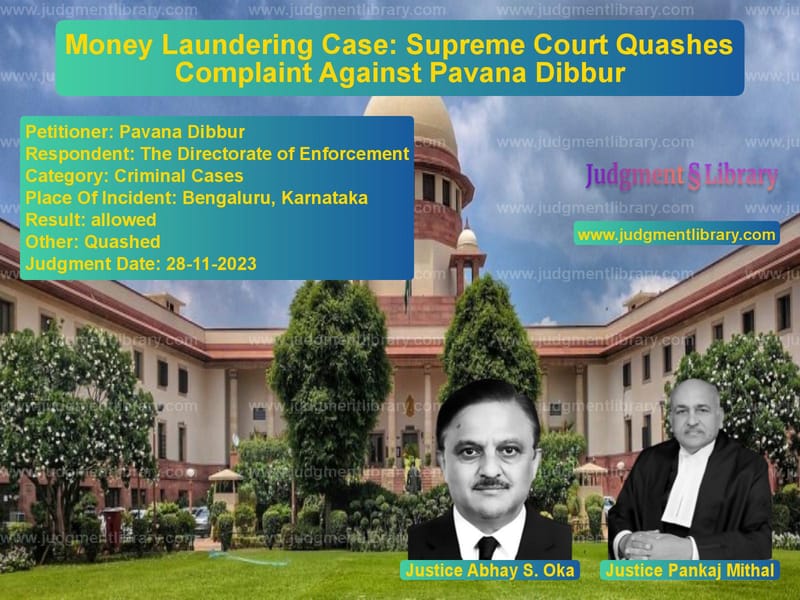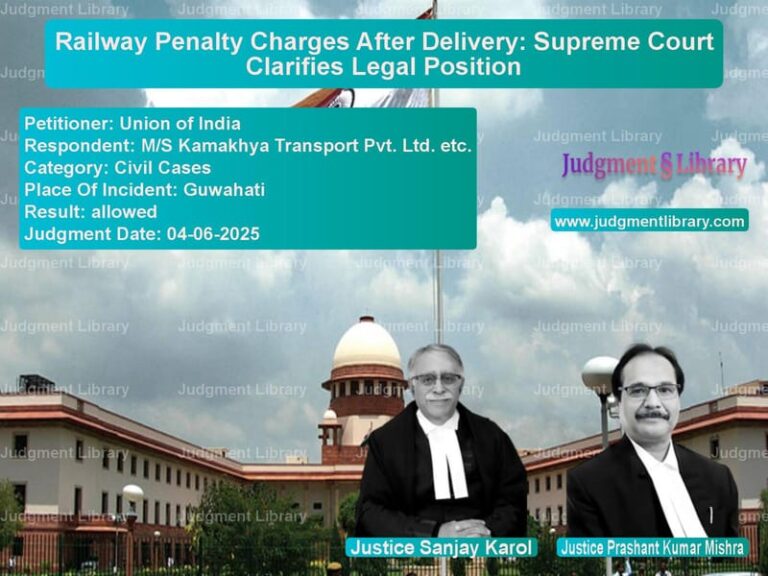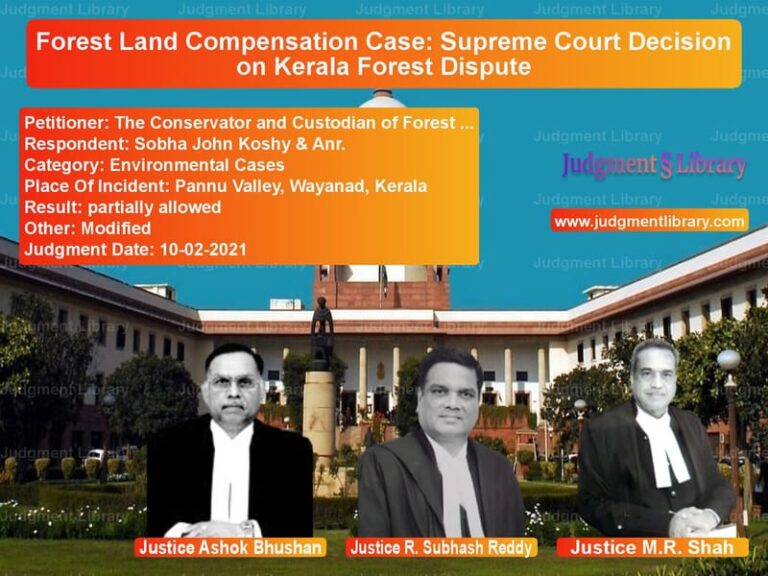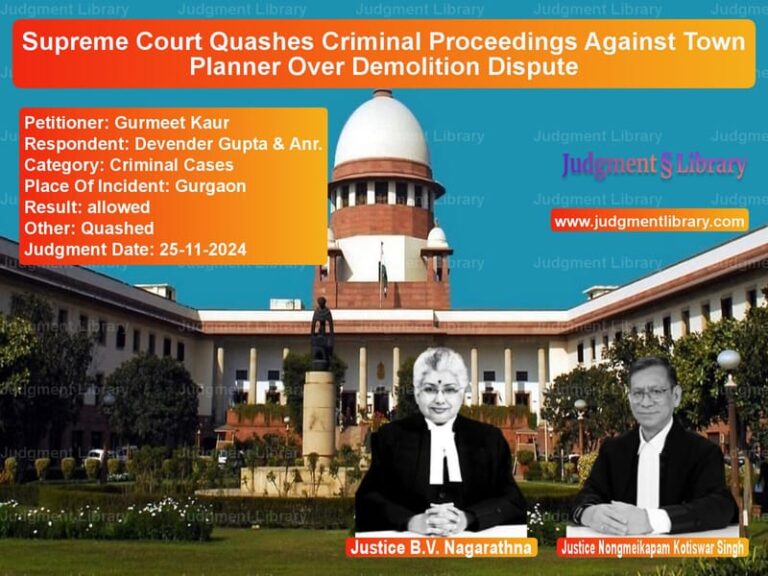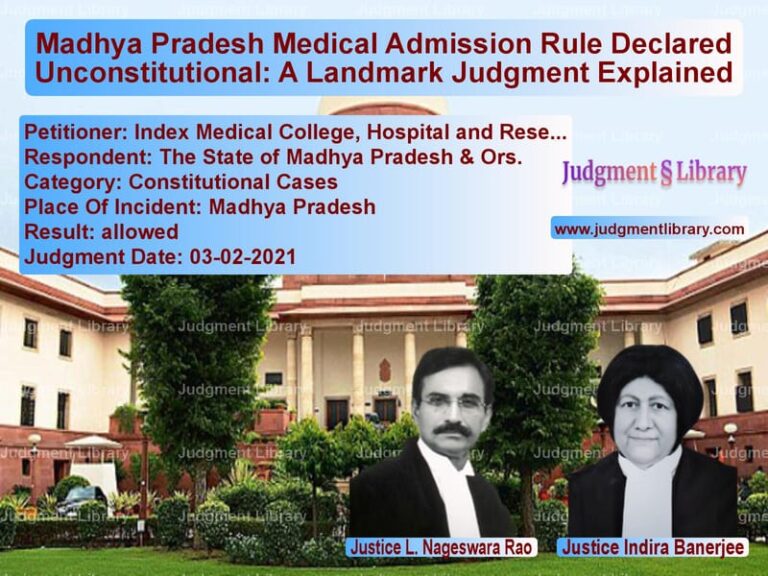Money Laundering Case: Supreme Court Quashes Complaint Against Pavana Dibbur
The case of Pavana Dibbur v. The Directorate of Enforcement pertains to allegations of money laundering under the Prevention of Money Laundering Act, 2002 (PMLA). The Supreme Court was called upon to decide whether a person could be prosecuted for money laundering if they were not named as an accused in the predicate offence.
Background of the Case
The case originated from allegations against Madhukar Angur, who was accused of siphoning off ₹107 crores from students of Alliance University between January 2017 and November 2017. The Directorate of Enforcement (ED) alleged that the proceeds of crime were transferred through various accounts, including those linked to the appellant, Pavana Dibbur. The appellant had purchased two properties:
- The First Property was bought on July 1, 2013, from Alliance Business School for ₹13.5 crores.
- The Second Property was acquired on June 29, 2019, from Madhukar Angur for ₹2.47 crores.
The ED alleged that these properties were acquired using proceeds of crime and attached them under Section 5 of the PMLA. A complaint was subsequently filed against the appellant before the Special Court for PMLA cases in Bengaluru.
Arguments of the Appellant
The appellant’s counsel, Ms. Meenakshi Arora, contended:
- The properties were not tainted assets and were not acquired using proceeds of crime.
- The appellant had declared an income of ₹26.42 crores under the Income Declaration Scheme, 2016 and paid taxes of ₹11.89 crores, demonstrating sufficient financial resources to purchase the properties legally.
- The appellant was not named as an accused in the FIRs or charge sheets related to the predicate offence. Therefore, she could not be prosecuted for money laundering under Section 3 of the PMLA.
- The ED was relying solely on a conspiracy charge under Section 120-B of IPC, which is insufficient to sustain a money laundering case.
Arguments of the Respondent
The Additional Solicitor General, Shri S.V. Raju, appearing for the ED, argued:
- Even if the appellant had independent financial means, it does not rule out the possibility that proceeds of crime were used to acquire the second property.
- A person can be guilty of money laundering even if they are not an accused in the predicate offence, as per Section 3 of the PMLA.
- The legislative intent of the PMLA is to prosecute all individuals involved in laundering illicit money, regardless of whether they were directly involved in the scheduled offence.
Supreme Court’s Observations
1. Connection Between Money Laundering and Predicate Offences
The Court noted that under the PMLA, the existence of a scheduled offence is a prerequisite for a money laundering case. However, the Court also stated:
“An offence under Section 3 of the PMLA can only be made out if there exist proceeds of crime linked to a scheduled offence.”
In this case, the Court found that the first property was acquired before the alleged commission of the predicate offence, and there was no direct evidence linking the second property to illicit funds.
2. Non-Accusation in Predicate Offence
The Court referred to its ruling in Vijay Madanlal Choudhary v. Union of India, emphasizing that a person cannot be prosecuted under PMLA unless there is a clear link between them and the predicate offence. It observed:
“A person who is not named in the scheduled offence cannot be automatically roped in under the PMLA.”
3. Section 120-B IPC Cannot Stand Alone
The Court rejected the ED’s argument that Section 120-B of IPC (criminal conspiracy) could, by itself, be used as a predicate offence. The Court ruled that criminal conspiracy must be linked to a specific scheduled offence for a PMLA case to proceed.
Final Judgment
The Supreme Court quashed the proceedings against the appellant, ruling that:
- The first property had no connection to the proceeds of crime.
- There was insufficient evidence to show that the second property was bought using illicit funds.
- The appellant could not be prosecuted under the PMLA as she was not named in the predicate offence.
- Section 120-B alone could not be used as a predicate offence for money laundering.
The Court ordered:
“The complaint being Special C.C No.781 of 2022 pending before the Special Court for PMLA cases, Bengaluru is, hereby, quashed only insofar as the present appellant is concerned.”
Key Takeaways
1. Predicate Offence is Essential for PMLA Cases
A person cannot be prosecuted for money laundering unless they are linked to a scheduled offence.
2. Possession of Legitimate Wealth is a Valid Defence
Declaring substantial income and paying taxes can be used to justify financial transactions and property acquisitions.
3. Section 120-B IPC Alone is Not a Sufficient Predicate Offence
The ruling clarifies that mere allegations of conspiracy without linking them to a specific scheduled offence do not justify prosecution under PMLA.
Conclusion
The Supreme Court’s ruling in this case sets a critical precedent in money laundering laws. By quashing the complaint against the appellant, the Court reaffirmed that mere suspicion without concrete evidence of the use of proceeds of crime is not enough to sustain a PMLA prosecution.
Petitioner Name: Pavana Dibbur.Respondent Name: The Directorate of Enforcement.Judgment By: Justice Abhay S. Oka, Justice Pankaj Mithal.Place Of Incident: Bengaluru, Karnataka.Judgment Date: 28-11-2023.
Don’t miss out on the full details! Download the complete judgment in PDF format below and gain valuable insights instantly!
Download Judgment: pavana-dibbur-vs-the-directorate-of-e-supreme-court-of-india-judgment-dated-28-11-2023.pdf
Directly Download Judgment: Directly download this Judgment
See all petitions in Money Laundering Cases
See all petitions in Fraud and Forgery
See all petitions in Bail and Anticipatory Bail
See all petitions in Judgment by Abhay S. Oka
See all petitions in Judgment by Pankaj Mithal
See all petitions in allowed
See all petitions in Quashed
See all petitions in supreme court of India judgments November 2023
See all petitions in 2023 judgments
See all posts in Criminal Cases Category
See all allowed petitions in Criminal Cases Category
See all Dismissed petitions in Criminal Cases Category
See all partially allowed petitions in Criminal Cases Category

